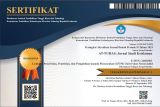Adji, O. S. (1983). Undang~Undang Pemberantasan Tindak Pidana Korupsi. Jurnal Hukum & Pembangunan, 13(6), 475. https://doi.org/10.21143/jhp.vol13.no6.1001
Ahmad, S., Anggraeni, N., & Pambudi, A. K. (2020). A. Djazuli’s Thinking Regarding Hifzu al-Ummah: Dismissing the Entangled Bureaucracy to Commemorate the Era of Society 5.0. De Jure: Jurnal Hukum Dan Syar’iah, 12(1), 86–101. https://doi.org/10.18860/j-fsh.v12i1.8700
Albert, F. (2016). Peran Dan Strategi Lembaga Bantuan Hukum (LBH) Padang Dalam Upaya Pemberantasan Tindak Pidana Korupsi. E-Skripsi Universitas Andalas. http://scholar.unand.ac.id/20298/
Asa’ari, A., Ahmad, J., Zufriani, Z., Witro, D., & Kustiawan, M. T. (2023). Considering Death Penalty for Corruptors in Law on Corruption Eradication from the Perspective of Maqāsid al-Syarī‘ah. Samarah, 7(2), 920–936. https://doi.org/10.22373/sjhk.v7i2.14944
Auda, J. (2015). Membumikan Hukum Islam Melalui Maqasid Syariah. Percetakan Mizan, Islam, 356.
Bakar, A. Y. A. (2016). Metode Istislahiah Pemanfaatan Ilmu Pengetahuan dalam Ushul Fiqh. 1–65.
Birahmat, B. (2018). kasus korupsi yang kian memprihatikan . Perbincangan problematika korupsi akademis dikategorikan sebagai kejahatan luar biasa ( extra ordinary crime ). menggunakan cara-cara yang biasa sebagaimana menangani tindak pidana. Jurnal Kajian Keislaman Dan Kemasyarakatan, 3(1), 66–85. https://doi.org/http://dx.doi.org/10.29240/jf.v3i1.457
Depag, R. (2007). Alquran dan Terjemahan. Al-Qur’an Terjemahan, 1–1100.
Dimpos Manalu (NOMENSEN). (2023). Diskusi FGD.
Eka N.A.M Sihombing dan Cynthia Hadita. (2022). Penelitian Hukum. Setara Press.
Erba, D. M. F., & Nofrianto, N. (2022). Implementation of Maqashid Syariah in Sharia Business Transactions. AL-FALAH : Journal of Islamic Economics, 7(1), 125. https://doi.org/10.29240/alfalah.v7i1.3703
Faridzi, M. Al, & Nachrawi, G. (2022). Kualifikasi Kejahatan Luar Biasa Terhadap Tindak Pidana Korupsi (Putusan Mahkamah Agung Nomor 301 K/Pid.Sus/2021). Jurnal Kewarganegaraan, 6(2), 3014–3019. https://doi.org/https://doi.org/10.31316/jk.v6i2.3244
Habib, A. (2020). Repay State Losses. 01(1), 1–14. https://doi.org/http://dx.doi.org/10.26623/jic.v8i2.6822
Helim, A. (2019). Maqasid Syariah versus Ushul Fiqh (Konsep dan Posisinya dalam Metodologi Hukum Islam) (p. 214).
Hikmah, I. W. (2022). Suap dalam Q.S. Al-Baqarah/2: 188 (Studi Analisis Ma’na-Cum-Maghza). PAPPASANG: Jurnal Studi Al-Qur’an-Hadis Dan Pemikiran Islam, 4(1), 90. https://doi.org/https://doi.org/10.46870/jiat.v4i1.156
Huang, S., & Sharifa, A. (2019). Penggunaan Konsep Bantuan Hukum Struktural Sebagai Pembangunan Budaya Hukum Nasional Indonesia (Structural Legal Aid As a Concept of Developing Indonesian National Legal Culture System). Majalah Hukum Nasional, 1(1), 195–196. https://doi.org/https://doi.org/10.33331/mhn.v49i1.97
Internasional, T. (n.d.). CPI. https://ti.or.id/corruption-perceptions-index-2023/
Internasional, T. (2024). CPI. CORRUPTION PERCEPTIONS INDEX 2023. https://ti.or.id/corruption-perceptions-index-2023/
Islam, D. P., Ppm, K., & Bogor, U. (2013). Penegakan Hukum Atas Keadilan ( FAIR LAW ENFORCEMENT IN THE ISLAMIC VIEW ). 1(2), 143–148. https://doi.org/https://doi.org/10.32507/mizan.v1i2.122
Laia, F., Susilawati, S., & Rosalina, M. (2020). Efektivitas Pemberian Bantuan Hukum Struktural dalam Proses Penyelesaian Perkara Pidana Secara Litigasi dan Non-Litigasi. Journal of Education, Humaniora and Social Sciences (JEHSS), 3(2), 750–760. https://doi.org/10.34007/jehss.v3i2.356
Marzukui, P. M. (2021). Penelitian Hukum. Kencana.
Matsum, H. (2023). Ketua MUI Kota Medan, Wawancara di Medan, Kamis, 13 September 2023.
Maulana, A. (2023). Wakil Ketua Bidang Advokasi & Jaringan Yayasan Lembaga Bantuan Hukum Indonesia, wawancara melalui telekomunikasi, tanggal 14 September 2023.
Nasution, A. B. (1982). Bantuan Hukum di Indonesia. LP3ES.
Pardosi, R. O. A. G., & Primawardani, Y. (2022). The Legitimacy Death Penalty Application of Certain Conditions in the Anti-Corruption Law. Jurnal Konstitusi, 19(3), 673–692. https://doi.org/10.31078/jk1938
Pendidikan, N., Dalam, A., & An, A.-Q. U. R. (n.d.). Nilai pendidikan antikorupsi dalam al- qur’an. 81–92. https://ojs.unsiq.ac.id/index.php/mq/article/view/906
Radja Malo Sinaga, D. S. (2023). Konglomerat Medan Mujianto Tersangka Korupsi Rp 39,5 M Menyerahkan Diri Baca artikel detiksumut, “Konglomerat Medan Mujianto Tersangka Korupsi Rp 39,5 M Menyerahkan Diri” selengkapnya https://20.detik.com/detikupdate/20230808-230808122/konglomerat-medan-m. https://www.detik.com/sumut/video/230808122/konglomerat-medan-mujianto-tersangka-korupsi-rp-39-5-m-menyerahkan-diri
Ramadhan, H. A., Y, Y., & Aksa, F. N. (2021). Tindak Pidana Korupsi Dalam Persfektif Hukum Pidana Dan Hukum Pidana Islam. Jurnal Ilmiah Mahasiswa Fakultas Hukum Universitas Malikussaleh, 2(3), 21–29. https://doi.org/10.29103/jimfh.v4i2.4267
Riki Afrizal, Iwan Kurniawan, F. W. (2020). Peran Bantuan Hukum Struktural Dalam Transformasi Sosial: Sebuah Upaya Mewujudkan Kesetaraan Gender Dan Perubahan Struktur Dalam Masyarakat. Jurnal Ilmiah Kebijakan Hukum, 14(1), 75–90. https://doi.org/http://dx.doi.org/10.30641/kebijakan.2023.V17.327-348
SAHdaR, I. (Koordinator. (2023). Wawancara.
Sari, R. K. (2023). PENANGGULANGAN MAFIA PERADILAN DALAM PERKARA PIDANA MELALUI REFORMASI SISTEM PERADILAN PIDANA. 02(02), 1–7. https://doi.org/https://doi.org/10.24967/jaeap.v2i01.2063
Sunggara, M. A., Meliana, Y., Gunawan, A. F., & Yuliana, S. (2021). 360-Article Text-709-1-10-20210430. Solusi, 19(2), 138–154. https://doi.org/https://doi.org/10.32503/diversi.v4i2.374.
Swardhana, G. M., & Setiabudhi, I. K. R. (2016). Buku Ajar Krimonologi dan Viktimologi (p. 69). https://simdos.unud.ac.id/uploads/file_pendidikan_1_dir/bb783580811d1c3af837fd4e9f38b28b.pdf
Tempo, M. L. (Jurnalis. (2023). Akal-akalan Konglomerat Medan Kabur dari Jerat Hukum, Mengaku Sakit Lalu Raib. Korupsi. https://fokus.tempo.co/read/1756773/akal-akalan-konglomerat-medan-kabur-dari-jerat-hukum-mengaku-sakit-lalu-raib
Triwulandari, A. M. (2020). Problematika Pemberian Bantuan Hukum Struktural dan Non Struktural Kaitannya dengan Asas Equality Before The Law. Jurnal Ilmiah Kebijakan Hukum, 14(3), 539. https://doi.org/10.30641/kebijakan.2020.v14.539-552
Verboden Voor Honden En Inlanders Dan Lahirlah LBH. (2012).
Wahyuningrum, K. S., Disemadi, H. S., & Jaya, N. S. P. (2020). Independensi Komisi Pemberantasan Korupsi: Benarkah Ada? Refleksi Hukum: Jurnal Ilmu Hukum, 4(2), 239–258. https://doi.org/10.24246/jrh.2020.v4.i2.p239-258
Wiratraman, H. P. (2016). Mempertimbangkan Kembali Orientasi Gerakan Bantuan Hukum Indonesia. Veritas et Justitia, 2(2), 466. https://doi.org/10.25123/vej.2276
Yusuf Al-Qaradhawi, S. (2022). Perkembangan Fiqh Antara Statis Dan Dinamis (H. M. A. Latief (Ed.); Edisi Indo, pp. 1–104). Cita Varia Kreativitas.
Zainuddin. (2019). ARGUMENTASI TEORI MASLAHAT SEBAGAI RUH PERUNDANG- UNDANGAN. Al Amin: Jurnal Kajian Ilmu Dan Budaya Islam P-ISSN: 2088-7981 E-ISSN: 2685-1148, Volume 2 N. https://doi.org/https://doi.org/10.36670/alamin.v2i1.13
Zubedi. (2013). Pengembangan Masyarakat Wacana & Praktik. Kencana Prenada Media Group.
 (UIN Sumatera Utara)
(UIN Sumatera Utara) 




.png)






